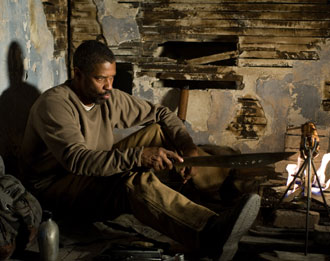 By Sara Shereen Bakhshian
By Sara Shereen Bakhshian
May contain spoilers.
Imagine a future where an apocalyptic war results in a “Flash”–blinding many of the few people who were left–followed by 30 years of chaos where people had to hunt and protect themselves from being captured by cannibals. Imagine a time where commodities people now find readily available are scarce. And where fresh water becomes currency.
The above is just a taste of Warner Bros. Pictures’ Jan. 15 release “The Book of Eli,” directed by the Hughes Brothers with Denzel Washington as the title character. Essentially, the film takes the action-adventure genre and adds a thought-provoking spiritual twist.
Washington becomes a lone warrior — packing the likes of a machete, sacred book, and an iPod — who isn’t afraid to kill if he has to. Although he does try to avoid it–like in one scene, where he hid as road bandits attacked a couple. Looking away, he repeated the mantra, “Stay on the path, it’s not your concern” again and again.
Eli’s path and purpose is slowly revealed in the film, to deliver the presumably last remaining Bible. And a fork in the road leads him to a town run by Carnegie (Gary Oldman). This is also where Eli meets his eventual associate Solara (Mila Kunis), the daughter of Carnegie’s partner/concubine, Claudia. Solara was born after the flash, not knowing life before or even how to read. But she has hope.
Much like the name suggests, Carnegie is a robber baron, ruling the town with some semblance of order. Carnegie’s power is his access to fresh water, yet it’s not enough. He is seeking a book that his road bandits–who are unable to read–can’t seem to find.
After Eli defends himself and massacres the road bandits, Carnegie orders an audience. It turns out both men are from the time before the “Flash” and they each want another existence. Ironically, rather than looking at the youth, Carnegie turns to Eli and says: “As old as we are, people like you and me, we are the future.”
Arguably the essence of the film is the two futures that Carnegie and Eli seek, how they go about getting them, and which one will prevail. Various film elements move it beyond a simplistic battle of good and evil.
Violence isn’t rare in the movie, however it isn’t glorified either, with only attractive action sequences. One might want to look away in certain scenes, but one can’t avoid the deafening gun shots in others.
The film sequences also have a graphic novel appeal, with a select set of hues in the cinematography. And the music is full of Asian-inspired tones, a possible attempt at distinguishing the film as more than simply a Judeo-Christian interpretation of the future.
Another intriguing aspect of this future is how characters who are blind or have limited sight end up in relatively powerful roles. One example is the servant who shaves Carnegie. Another is Claudia (Jennifer Beals), who will do anything to protect Solara.
In one scene Eli says to Solara that he walks by faith, not by sight and things don’t necessarily have to make sense. That might be the key takeaway of the film. All the questions in “The Book of Eli” don’t necessarily have to have answers that tie things up neatly.
That being said, audiences might come away asking: Is this a predominately religious film? Is Eli blind? What happened to Carnegie?
What is certain though is that “The Book of Eli” will spur many discussions–spiritual and otherwise.
Photo: Warner Bros./David Lee


